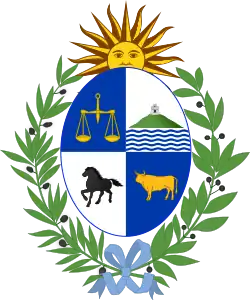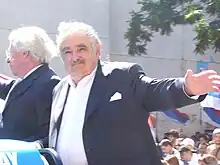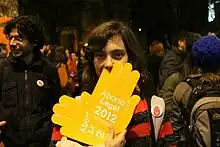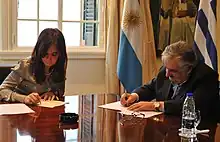Presidency of José Mujica
The presidency of José Mujica began on 1 March 2010 when he was inaugurated as the 40th constitutional president of Uruguay. Mujica, a member of Broad Front's Movement of Popular Participation, took office following his victory over the National Party's nominee Luis Alberto Lacalle in the second round of the 2009 Uruguayan general election, thus continuing another five years of leftist government.
 | |
| Presidency of José Mujica 1 March 2010 – 1 March 2015 | |
| Cabinet | See list |
|---|---|
| Party | Broad Front |
| Election | 2009 |
| Seat | Executive Tower |
 | |
This presidential term from one side continued the policies established since the Broad Front came into power in 2005, but on the other hand, introduced novel or innovative social policies such as the regulation and legalization of the market of cannabis, the appoval of the same-sex marriage law and the legalization of abortion for women. This period also had the establishment of the second public university of Uruguay, the Technological University (UTEC).
Among the controversial issues developed during this administration was the case of the closure of state aviation company PLUNA and sell of its assets, that involved the minister of Economy, the president of the Bank of the Republic and Argentine entrepreneur Juan Carlos López Mena. Another case was the regasification plant and Gas Sayago company, that at the end did not came into working and led to losses of public funds.
Background
In the first round of the 2009 Uruguayan general elections, Broad Front's José Mujica-Danilo Astori candidacy reached 47.96% of the valid votes against the 29.07% obtained by National Party's team of Luis Alberto Lacalle-Jorge Larrañaga, and the 17.02% of Colorado Party's nominees Pedro Bordaberry-Hugo de León, among other participant parties. This election granted Broad Front a majority in the Chamber of Deputies and in the Senate.[1][2]
Due to none of the parties exceeded the 50% threshold to automatically win during the first round, it was required to have a second round to elect the presidential formula among the two most voted parties. It took place on 29 November between Broad Front's and National Party's candidates. Broad Front's formula finally ended up winning after it obtained the 54.63% of the valid votes against the 45.37% of National Party.[1][2]
Inauguration

José Mujica was inaugurated as the new President of Uruguay on 1 March 2010. Several Latin American presidents attended this event: Cristina Fernández of Argentina, Evo Morales of Bolivia, Luiz Inacio Lula da Silva of Brazil, Álvaro Uribe of Colombia, Rafael Correa of Ecuador, Álvaro Colom of Guatemala, Fernando Lugo of Paraguay, and Hugo Chávez of Venezuela. The Prince of Asturias Felipe de Borbón representing Spain and Secretary of the State Hillary Clinton from the United States also attended this ceremony.[3]
His wife Lucia Topolanksky took his oath, as well as Astori's oath. During his inauguration speech he talked about the need of a state reform. He mentioned the education, the environment and the public safety as priority issues.[4]
Cabinet
| Office | Name | Term |
|---|---|---|
| President | José Mujica | 2010-2015 |
| Defense | Luis Rosadilla | 2010-2011 |
| Eleuterio Fernández Huidobro | 2011-2015 | |
| Economy and Finance | Fernando Lorenzo | 2010-2013 |
| Mario Bergara | 2013-2015 | |
| Education and Culture | Ricardo Ehrlich | 2010-2015 |
| Foreign Relations | Luis Almagro | 2010-2015 |
| Industry, Energy and Mining | Roberto Kreimerman | 2010-2015 |
| Interior | Eduardo Bonomi | 2010-2015 |
| Livestock, Agriculture and Fisheries | Tabaré Aguerre | 2010-2015 |
| Public Health | Daniel Olesker | 2010-2011 |
| Jorge Venegas | 2011-2013 | |
| Susana Muñiz | 2013-2015 | |
| Labour and Social Welfare | Eduardo Brenta | 2010-2013 |
| José Bayardi | 2013-2015 | |
| Social Development | Ana María Vignoli | 2010-2011 |
| Daniel Olesker | 2011-2015 | |
| Transport and Public Works | Enrique Pintado | 2010-2015 |
| Tourism and Sports | Héctor Lescano | 2010-2012 |
| Liliam Kechichián | 2012-2015 | |
| Housing, Territorial Planning and Environment | Graciela Muslera | 2010-2012 |
| Francisco Beltrame | 2012-2015 | |
Mujica's cabinet was firstly made up by the following politicians: Fernando Lorenzo as the minister of Economy and Finance as well as Pedro Buonomo as his deputy secretary, Roberto Kreimerman as minister of Industry, Energy and Mining with Edgardo Ortuño as the deputy secretary of the ministry, Tabaré Aguerre as minister of Livestock, Agriculture and Fisheries together with Daniel Garín as the deputy secretary, Graciela Muslera as the minister of Housing, Territorial Planning and Environment along with Jorge Patrone as the deputy secretary of this ministry, Enrique Pintado as the minister of Transport and Public Works and Pablo Genta as the deputy secretary, Luis Rosadilla as the minister of National Defense with Gabriel Castellá as the deputy secretary, Ana María Vignoli as minister of Social Development with Lauro Meléndez as the deputy secretary, Eduardo Bonomi as minister of the Interior and Jorge Vázquez as deputy secretary of the Interior, Luis Almagro as minister of Foreign Relations with Roberto Conde as his deputy secretary, Eduardo Brenta as minister of Labour and Social Welfare together with Nelson Loustaunau as the deputy secretary, Ricardo Erlich as minister of Education and Culture with María Simón as deputy secretary, Daniel Olesker as the new minister of Public Health and Jorge Enrique Venegas as the deputy secretary, Héctor Lescano as minister of Tourism together with Liliám Kechichián as the deputy secretary of that ministry.[5]
On 26 July 2011, Eleuterio Fernández Huidobro, who in May of that year resigned his seat in the Senate due to disagreements with a law draft proposed from the Executive, was appointed as the new minister of Defense, replacing minister Rosadilla who resigned due to health reasons.[6]
Domestic policy
Education
During Broad Front's first presidency led by Tabaré Vázquez, a line of action on educational policies was established by the General Law on Education, the National Plan of Education 2010-2030 and the National Strategy of Childhood and Adolescence 2010–2030. However, these guidelines were not strictly followed by Mujica's administration regarding the implemented measures.[7]
The measures on education taken during this administration tended toward the promotion of the educational inclusion through the democratization of the educational system, giving boost to the infrastructure of schools, the establishment of the Council of Training in Education and of the National Institute of Educational Evaluation, but according to María Ester Mancebo and Alexandra Lizbona, that meant that Broad Front's second administration tended to keep the statu quo in the mandatory education system, without managing to wholly deploy the institutional framework foreseen by the General Law on Education. These scholars also pointed out that despite their strategic importance, two educational policies were not deployed: the reform of the secondary education and the reform of the statute of the teaching staff.[7]
At the end of 2012 the creation of the Technological University of Uruguay, the second public university of Uruguay, was passed, with a technological focus and with a strong presence in the Uruguayan interior, in order to decentralize the tertiary education of the country.[8] During this administration, since its creation by law, the founding period of the university saw its first budget assignment, the appointment of a provisional Central Board of Directors members Pablo Chilibroste, María Antonia Grompone and Rodolfo Silveira,[9] and started to draft the first university degrees.[10]
Project Aratirí
Project Aratirí was an open pit mining project for iron extraction in Uruguay proposed by the Indian multinational company Zamin Ferrous, with an intended investment of 3 billion of dollars. This project was planned to be executed in the region between Treinta y Tres, Durazno and Florida Departments, over the Cuchilla Grande hill range and near Cerro Chato and Valentines settlements. This project also proposed the creation of a deep water port and a 214-kilometer pipeline to transport the minerals from the open pit mines to that proposed port, through which the concentrated iron would be exported. Finally this project would have failed.[11]
Regasification plant and Gas Sayago
Another project announced by this administration was one that intended to build a regasification plant at the shores of Western Montevideo's Puntas de Sayago area, including a pier of 1800 meters, a dock and a gas pipeline. This would also included an anchored ship to store the natural gas, process it and send it to the liquefied gas network. These works sought to obtain gross profits of around a billion dollars for UTE and 150 million for ANCAP, in addition to have the fee of natural gas reduced for the population.[12]
Plan Juntos
The Plan of Social and Housing Integration "Juntos", or "Plan Juntos" (Plan "Together"), was an initiative launched at the beginnings of the administration to provide low-income families the access to a decent housing. This project supposed to be a plan to support the build up of a home and was not just a housing plan, as it also intended the labour development, social insertion and citizenship participation, encouraging the regeneration of broken bonds due to the poverty and marginalization at the family, neighbourhood and civic levels. In other words, it was established to encourage the participation of the beneficiaries and social solidarity through society's support with technicians or workforce, or seeking donations of money or materials from the private sector. It had the financial support of José Mujica, who donated part of his salary of president to finance the project.[13][14]
Legalization of cannabis

On 20 December 2013, Law No. 19172 was promulgated, and it legalized and regulated the production, distribution, and sale of cannabis, and created the Institute of Regulation and Control of Cannabis to watch for several aspects of import, production and sale of cannabis. It allowed the self-cultivation for residents, up to a maximum of six plants, or a maximum yearly production of 480 grams. It also allowed the creation of cannabis clubs where their members, whose number must be between 15 and 40 associates, are allowed to grow up to 99 cannabis plants to produce proportionally for their associates. Besides that, it made possible to buy state cannabis in pharmacies, where users can buy up to 40 grams monthy.[15]
Legalization of abortion

In October 2012, abortion by women's own choice was decriminalized and legalized, provided that it was performed under the requirements set by the Voluntary Interruption of Pregnancy Law No. 18987 of 22 October 2012. This law established that it was mandatory for every health centers to provide a pregnancy interruption service after women's request.[16][17]
In order to perform an abortion, it must be requested within the first twelve weeks of pregnancy. The woman must notify her physician her willingness to perform an abortion, then she will be attended by a multidisciplinary team of professionals to inform her of what an abortion entails and after that she is granted a five-day period of thought to reconsider her will. Once this reflection period ends and she did not change her will to abort, the medical procedure is carried out.[18]
Since the legalization, it was recorded a decrease of the average maternal mortality, from 25 deaths per 100,000 live borns in 1999, to 14 deaths per 100,000 live borns in 2015, due to the establishment of a risk reduction model and to the decriminalization of the abortion that reduced the maternal mortality caused by unsafe abortions. Another contribution of the decriminalization is that reduced the infant mortality after the decrease of maternal mortality, because when one of the parents, and particularly the mother, dies, infant mortality tends to increase, but after the reduction of maternal mortality created by unsafe abortions, the risk of infant mortality as a consequence of their mother's death is reduced. From the legalization, there was a period of temporary increase in the number of abortions, but that stabilized during the next years and began a gradual decrease, that compared to when the abortion is illegal, where the prevalence of abortion is greater. Along this legalization came a plan to promote the use of contraconceptive to avoid unwanted pregnancies.[19]
Same-sex marriage law
The Egalitarian Marriage Law was approved on 10 April 2013 by the Parliament,[20] and once promulgated by the Executive, marriage was redefined by not requiring to be made up of two persons of different sex. It also reformed the way divorce is performed and the order of the parents' surnames are assigned to the children, in the latter, the order of surnames of heterosexual couples may be reversed and for homosexual couples could be chosen by agreement or by judicial lottery.[16]
Foreign policy
Fray Bentos international bridge blockade lifting

At the beginnings of 2010, after years of blockade by the citizens of Gualeguaychú city in Entre Ríos, Argentina, the international bridge connecting that city to Uruguayan Fray Bentos was reopened, after a Gualeguaychú neighbours' assembly decided by majority to lift it, that would happen under pressure of the administration of Cristina Fernández following the passing of a decree denouncing before federal courts several individuals from Gualeguaychú blockade group for the alleged commission of crimes. The blockade lifting was promoted after talks with President Mujica where he accepted the request from the President of Argentina to perform joint binational controls of the pulp mill, besides that Mujica did not object the designation of Néstor Kirchner, Fernández' husband, as Secretary General of the Union of South American Nations, that it could only be achieved by unanimity or consensus, which until then had been vetoed by former Uruguayan president Vázquez in retaliation for the blockade of the bridges.[22][23]
Recognition of Palestine
On 15 March 2011 president announced the official recognition of Uruguay to the State of Palestine as a sovereign and independent state, according to the principles of international law, and the establishment of bilateral diplomatic relations. However, this recognition omitted to say with which borders the State of Palestine was going to be recognized.[24]
Officials from the government of Israel criticized this action, and described it as "a step that will only move away the Palestinians from the peace process instead of encouraging them to return to dialogue", and that the best way to reach a peace agreement is through negotiations and not statements.[25]
Reception of Guantanamo Bay detention camp detainees
In March 2014, president Mujica accepted the request of the United States government to receive five inmates from the Guantánamo Bay prison, internationally known for the violations of human rights of its detainees. Mujica accepted and stated that he proceeded with Obama's request because its a matter of human rights, of individuals who were imprisoned for years without having gone through trial.[26]
Reception of Syrian refugees
During the humanitarian and migratory crisis that arose with the beginning of the Syrian civil war and the war against the Islamic State in 2014, the Uruguayan government expressed its desire to shelter Syrian refugee families from Lebanon to the United Nations High Commissioner for Refugees. After an interviewing process, five families overall consisting of 42 persons were selected, among who there were 33 underaged individuals.[27]
Since they arrived in Uruguay, they were granted permanente residency and provided with accommodation, translation services, access to healthcare, educational and labour adaptation, in addition to receiving a monthly pension whose amount depended on the number of underage children.[27]
At one point these families protested publicly, stating that the country had a high cost of living, the incomes were too low and the job opportunities were few, besides that they were worried about the issue of public insecurity. They also expreseed their outrage saying that they were "deceived" by the Uruguayan authorities about the information about the country they were given and the promises of "an easy life".[27]
Seven years later, in 2022, four of the five refugee families remained in Uruguay and one left the country. After some initial economic troubles, the families that stayed in the country managed to adapt, some of them dedicated themselves to a peasant life and others started to work or study, living this process with a low profile. One of the families obtained legal citizenship, with the right to vote, and Uruguayan passports, and they expressed their desire to remain "in a calm country, with freedom".[28]
Other issues
In the vote on the draft resolution of the United Nations General Assembly to condemn the annexation of Crimea by Russia, Uruguay abstained, despite agreeing with several of the ideas in the draft, although the Uruguayan representative in the session expressed his position of adherence to international law, that no pronouncement contrary to the Ukrainian Constitution should end with the alteration of the internationally recognized borders of that country nor contravene the principle of territorial integrity of the countries. But other aspects of political nature presents in the draft that was under deliberation, considered inconvenient by Uruguay, led to the abstention.[29]
See also
References
- "Series de Resultados de Elecciones Presidenciales" (in Spanish). Instituto Nacional de Estadística. Archived from the original on 2014-07-14. Retrieved 2021-10-08.
- Garcé, Álvaro (2010). "Uruguay 2009: De Tabaré Vázquez a José Mujica". Revista de ciencia política (in Spanish). Santiago: Instituto de Ciencia Política, Pontificia Universidad Católica de Chile. 30 (2): 499–535. doi:10.4067/S0718-090X2010000200017. ISSN 0718-090X.
- "Jura Mujica, "agricultor y campesino de alma"" (in Spanish). Radio France Internationale. 2010-03-01. Retrieved 2023-08-31.
- "Ex guerrillero José Mujica asume como presidente en Uruguay". El Universo (in Spanish). Montevideo. AP. 2010-03-01. Retrieved 2023-08-31.
- "Perfil de todos los ministros y subsecretarios de Mujica". Montevideo Portal (in Spanish). 2010-03-03. Retrieved 2023-08-08.
- "Fernández Huidobro asume como ministro de Defensa" (in Spanish). El Observador. 2011-07-26. Retrieved 2020-12-24.
- Mancebo & Lizbona 2016, section: «El statu quo en la educación obligatoria: entre la partidocracia, los sindicatos y el fantasma de la Reforma Rama» pp. 91-115
- López Lacuague, Macarena (2017). Proceso de creación de la Universidad Tecnológica en Uruguay (Thesis) (in Spanish). Facultad de Ciencias Sociales, Universidad de la República. Retrieved 2021-10-09.
- "UDELAR critica a UTEC". InfoRío (in Spanish). Río Negro. Búsqueda. 2018-07-17. Retrieved 2022-03-28.
- Cabrera, Magdalena (2016-09-05). "Cómo funciona una universidad moderna". El Observador (in Spanish). Retrieved 2022-01-31.
- "Aratirí: un repaso histórico sobre el proyecto que no llegó a concretarse". El Observador (in Spanish). 2020-08-09. Retrieved 2021-11-02.
- "Cómo funcionará la planta regasificadora". Ciento Ochenta (in Spanish). 2013-05-24. Retrieved 2022-01-31.
- Magri, Altaïr Jesica (July 2013). "El Plan Juntos de emergencia habitacional en Uruguay. Respuestas gubernamentales cuando el Estado no alcanza sus metas". Revista de Ciencias Sociales (in Spanish). Montevideo: Facultad de Ciencias Sociales, Universidad de la República. 26 (32): 133–150. ISSN 0797-5538. Retrieved 2021-09-10.
- Muñoz, Amanda (2014-09-18). "Más que un techo". La Diaria (in Spanish). Retrieved 2021-09-10.
- "Ejecutivo promulgó ley que regula producción, distribución y venta de cannabis". Todo el campo (in Spanish). 2013-12-31. Archived from the original on 2021-10-06. Retrieved 2021-10-06.
- Arocena, Felipe; Aguiar, Sebastián (January 2017). "Tres leyes innovadoras en Uruguay: aborto, matrimonio homosexual y regulación de la marihuana". Revista de Ciencias Sociales (in Spanish). Montevideo: Facultad de Ciencias Sociales, Universidad de la República. 30 (40): 43–62. ISSN 1688-4981. Archived from the original on 8 October 2021. Retrieved 8 October 2021 – via SciELO Uruguay.
- "Ya es Ley: Mujica firmó y promulgó la despenalización del aborto en Uruguay por la sola voluntad de la mujer". LaRed21 (in Spanish). 2012-10-23. Retrieved 2021-10-08.
- "La ley y su implementación". Montevideo Portal (in Spanish). 2012-10-18. Retrieved 2022-03-02.
- Briozzo, Leonel (2020-11-28). "La experiencia uruguaya de la despenalización del aborto: dos décadas de compromiso provida y proderechos". La Diaria (in Spanish). Retrieved 2022-03-02.
- Recoba, Diego (2013-04-11). "Iguales ante la ley". La Diaria (in Spanish). Retrieved 2021-10-11.
- Carracedo & Senatore 2016, section «Las políticas laborales y las relaciones de trabajo durante el gobierno de José Mujica». pp. 15-42.
- Rebossio, Alejandro (2010-06-17). "Gualeguaychú levanta el bloqueo con Uruguay". El País (in Spanish). Buenos Aires. Retrieved 2022-09-27.
- Perasso, Valeria (2010-06-17). "Argentinos levantan bloqueo a Uruguay". BBC News (in Spanish). Argentina. Retrieved 2022-09-27.
- "Uruguay oficializó reconocimiento al Estado palestino". ABC (in Spanish). Montevideo. Agence France-Presse. 2011-11-15. Retrieved 2022-02-17.
- "Palestina satisfecha por reconocimiento de Uruguay". Montevideo Portal (in Spanish). 2011-03-16. Retrieved 2022-02-17.
- "Mujica aceptó que Uruguay reciba a cinco presos de Guantánamo" (PDF). Informe de Política Exterior Uruguaya (in Spanish). Observatorio de Política Exterior Uruguaya (University of the Republic, School of Social Sciences) (349). 2014-03-24. ISSN 1688-7786.
- Rodríguez Camejo, Raquel (October 2017). "Los refugiados sirios en Uruguay: un tema incómodo". Revista Migraciones Forzadas (in Spanish) (56): 54–55. ISSN 1460-9819. Retrieved 2022-03-06.
- Urwicz, Tomer (2022-05-08). "La familia que se volvió uruguaya, siete años después de la guerra de Siria". El País (in Spanish). Montevideo. Retrieved 2022-05-09.
- "Uruguay se abstiene sobre anexión de Crimea a Rusia" (PDF). Informe de Política Exterior Uruguaya (in Spanish). Observatorio de Política Exterior Uruguaya (University of the Republic, School of Social Sciences) (350). 2014-03-30. ISSN 1688-7786.
Bibliography
- Bentancur, Nicolás; Busquets, José Miguel, eds. (2016). El Decenio Progresista. Las políticas públicas de Vázquez a Mujica (in Spanish). Montevideo: Fin de Siglo.